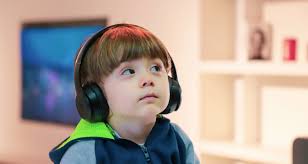Occupational Therapy
What is Therapeutic Listening?
Therapeutic Listening is an integrated auditory intervention designed to support individuals who experience challenges with sensory processing, various behavioral and emotional difficulties, and developmental delays. It is not a one-size-fits-all solution but tailored to each child’s needs. Therapeutic listening stimulates the vestibular- cochlear system, which is the attending and organizing mechanism of the middle ear. This program involves children listening to specially designed music and sound frequencies that stimulate and regulate the nervous system and areas of the brain which support development of motor coordination, attention, and social-emotional regulation.
 Studies on Therapeutic Listening reveal that individuals can experience many positive changes. Positive changes that you can expect will vary from person to person as the program is individualized so therefore the results will also be individualized. Changes often reported include:
Studies on Therapeutic Listening reveal that individuals can experience many positive changes. Positive changes that you can expect will vary from person to person as the program is individualized so therefore the results will also be individualized. Changes often reported include:
- Improved social interactions;
- Improved communication skills;
- Enhanced ability to focus;
- Ability to make transitions or adapt to changes in routine easier;
- Increased engagement in the world;
- Improvements in sleeping;
- Regulation of hunger and thirst cycle regularity;
- Toilet training/cessation of bed wetting;
- Regulation of mood and energy level (overall a happier child, less irritable, less hyperactivity or low arousal);
- Improved ability to respond to sounds and verbal directions;
- Increased participation in and exploration of playground equipment (swings, slides, climbing structures).
The Science Behind Therapeutic Listening
 The auditory system plays a critical role in how we process and respond to sensory information. Our auditory system has vast connections to the entire brain and influences the nervous system. Music with modified rhythms and tones can help synchronize brain waves, improving motor control, sensory processing, and coordination. In addition, it influences the nervous system which can help to reduce anxiety and promote a state of calm alertness. The sensory input provided through Therapeutic Listening may also help create new neural pathways enhancing cognitive and sensory processing abilities.
The auditory system plays a critical role in how we process and respond to sensory information. Our auditory system has vast connections to the entire brain and influences the nervous system. Music with modified rhythms and tones can help synchronize brain waves, improving motor control, sensory processing, and coordination. In addition, it influences the nervous system which can help to reduce anxiety and promote a state of calm alertness. The sensory input provided through Therapeutic Listening may also help create new neural pathways enhancing cognitive and sensory processing abilities.
Who is a Good Candidate for the Therapeutic Listening Program?
Individuals with a wide variety of delays and disorders can benefit from the Therapeutic Listening program. Therapeutic listening can be used with ALL ages of individuals from under 2 years to adulthood! Some delays/disorders that Therapeutic Listening has helped include but are not limited to:
- Autism;
- ADD/ADHD;
- Anxiety Disorders;
- Auditory Processing Disorders;
- Cerebral Palsy;
- Developmental Delays;
- Down Syndrome;
- Executive Functioning Disorders;
- Feeding Disorders;
- Fine & Gross Motor Delays; and
A family’s experience with Therapeutic Listening.
How Does the Program Work at Therapy Innovations?
Listening is a whole-body experience that connects us to the world outside ourselves and is the most basic precursor to interaction, speaking, reading, and writing. Therapists at Therapy Innovations are trained and skilled in the use of the Therapeutic Listening Program. We use Therapeutic Listening as part of an intensive home program that is designed by one of our trained therapists to meet the unique needs of each child. This program has helped our clients to make very significant and lasting improvements in their abilities, when it is followed correctly.
Most Therapeutic Listening Programs typically last from 8-weeks to several months, but remember that the program is based upon each child’s response and their individual needs. Parents and caregivers play an important part in tracking progress across environments, noting any changes in behavior, sensory processing, and overall functioning. After the initial evaluation, we regularly assess the child’s progress, adjusting the intensity or playlist if necessary. These regular “check-in” sessions help ensure that the child’s needs are being met and that the intervention is effective.
Therapeutic Listening is not covered by insurance as it is an intensive home-based program. We offer very reasonable fees for the program that include the evaluations, bi-weekly sessions, and rental of equipment on a monthly basis.
What to Expect at an Evaluation for the Therapeutic Listening Program?
 During your child’s individual Therapeutic Listening evaluation, the trained therapist will gather developmental and sensory motor history and evaluate how your child’s sensory and emotional challenges impact their daily functioning. This includes assessing their ability to:
During your child’s individual Therapeutic Listening evaluation, the trained therapist will gather developmental and sensory motor history and evaluate how your child’s sensory and emotional challenges impact their daily functioning. This includes assessing their ability to:
- Participate in daily activities (e.g., dressing, eating, schoolwork).
- Engage in play and social interactions.
- Cope with transitions and changes in their routines.
- Focus across all environments.
How Do I Get Started?
If you feel that your child may be a good candidate for Therapeutic Listening and you are interested in setting up an evaluation, all you need to do if call the office that you are closest to! We have trained therapists at all 3 of our locations ready to help your child!
